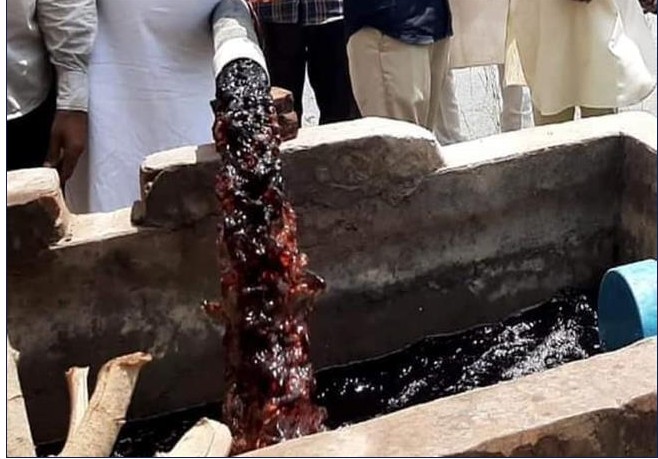Chandigarh: In the first week of July, a viral video of a Sangrur tubewell spewing out chemically contaminated water (blood red water) in Aloarakh village near Bhawanigarh town of the district raised eyebrows of many Punjabis, but this is the reality of many villages in Punjab. This is not the first case. In 2019, another case of a private company too surfaced from Sangrur. They too were disposing of their poisonous waste into the land while adopting reverse boring.
Sadly, reverse boring inside the land for years now has resulted in this sorry state of affairs. However, the Punjab Pollution Control Board (PPCB) has an easy answer and says it is the mistake of the past. “Point is, PPCB officials were working 15 years ago too, and reverse boring was as dangerous as it is now,” said 19-year-old boy Sukhwant Singh from Sangrur Bhawanigarh town. He has been watching and hearing of such incidents almost every day around him.
In the recent case of a tubewell spewing blood red water, the PPCB has laid the blame on a private factory dismantled 15 years ago. The National Green Tribunal took cognizance of the case and directed the Central Pollution Control Board to constitute a five-member committee to assess the ground situation and recommend the measures required to be taken within two months. The NGT, in its orders, specified that the committee may ascertain the number of tubewells discharging coloured water, depth of such wells, aquifer status in terms of movement and extent of contamination, characteristics of contaminated water concerning effluent sludge disposed of by the industry in question, dyes and dye intermediate, effect on crops, and bio-magnification in agro products. It may suggest short and long-term solutions considering agronomy and public health, remediation plan, and cost of such remediation. Farmers and owners of the land where the tubewell is located claimed that they had been raising the issue for over 10 years, but no one listened to their plight. Kulwinder Singh, 60, the tubewell owner, said a private unit had polluted the groundwater. On digging up to over 200metre, the problem started. “The tubewell of my nephew Amrit Singh was also spewing polluted water. A team came to inspect the site. The waste chemicals of the factory were being disposed of into the land using a borewell. This polluted the entire groundwater of the area,” said Kulwinder Singh, who owns five acres of land.
“I irrigate my fields from the tubewells of neighbours. I am not raising this issue for my land, I want to save the next generations from contaminated water,” he claimed. Sukhchain Singh, a farmer, said the government should punish those polluting the groundwater. PPCB member secretary Karunesh Garg said the factory was dismantled in 2005 and the department had taken up the matter with the NGT, which had imposed a fine of Rs 2 crore on factory owners, who did not pay up. “Our team has visited the sites. As of now, a tubewell was found throwing out coloured water, but we were told that there are two or three other tubewells. We have sent a report to the state government,” Garg added. “We got the sample tested and the water is safe for irrigation, but not fit for drinking, It is just a problem in a small chunk of land, not of entire Punjab,” Garg said.
On the other hand, Gurpreet Singh Chandbaja, founder and president of Bhai Kanahia Cancer Roko Sewa Society (BKCRSS) and convener of the Naroa Punjab Manch (NPM) from Faridkot, has taken strong notice of the pollution of the subsoil water. Though the video of only one tubewell has gone viral, yet four such tubewells are pumping out highly polluted water in the village. One tubewell is located on the land of the village panchayat and three others are owned by the farmers.
Though they used to pump out polluted water earlier too, yet this year, they have started pumping out highly polluted water, raising many questions about the pollution level of the subsoil water. A person is allegedly saying in the viral video that the said tubewell is pumping out chemically-laced water because there was a factory years ago which injected its chemically-laced water through a borewell. “The water is so contaminated that it is not even fit to irrigate the crops,” he said.
“According to officials of the Pollution Control Board, the problem of the pollution of the subsoil water at the particular location has happened because a factory allowed its chemical water into the ground through a borewell floating all the rules,” Chandbaja said. Social activists said that it was the responsibility of the Punjab Pollution Control Board to stop the industrial pollution, but the PPCB has failed it then and now too, it has failed to check the industrial waste in river Sutlej.
Reverse boring: Tubewell spewing blood red water
- Advertisement -

